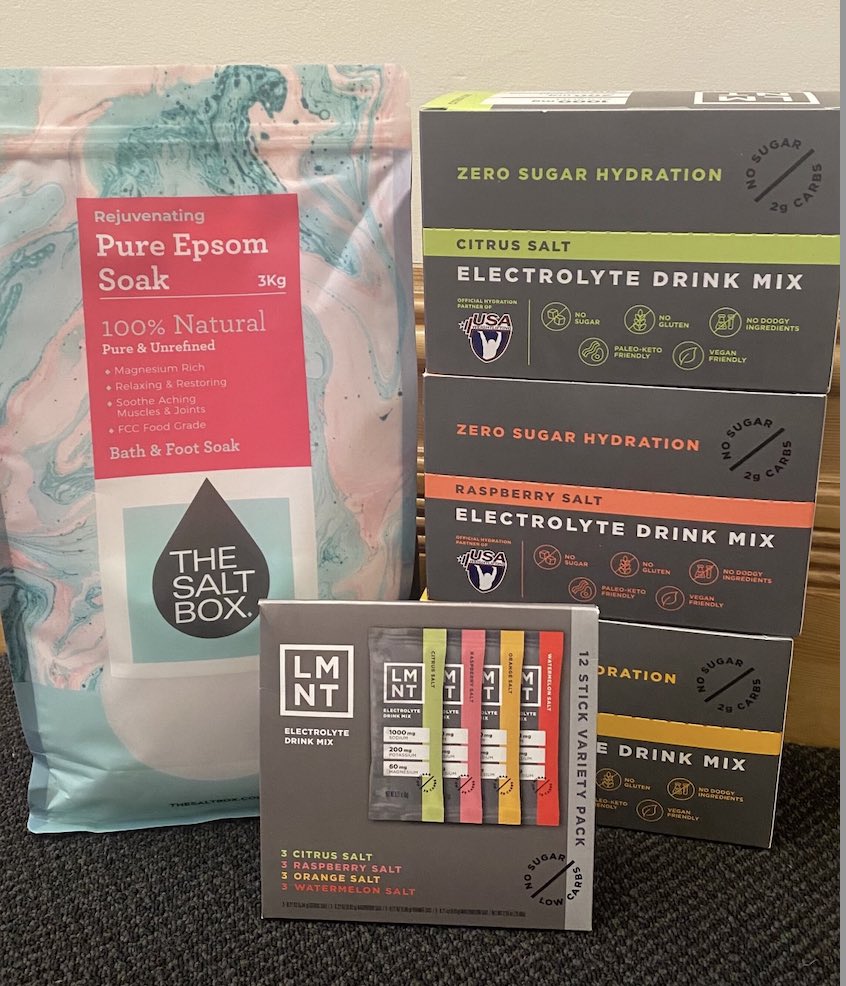Magnesium: what, why and HOW Resilient Health's support products might suit you
Researched and written By our Osteopaths: Dr Casey Beaumont and Dr Mel Pierlot
Magnesium (chemical symbol- Mg) is an essential mineral that supports over 300 biological reactions in the body!
Magnesium is a catalyst- meaning, it supports other chemical reactions in the body to occur at a much faster rate than otherwise possible.*
Magnesium helps with energy production, DNA/RNA synthesis and repair, antioxidant production, fat metabolism, bone formation and protein synthesis. Magnesium also plays a role in the movement of calcium and potassium across our cell membranes. This movement of calcium and potassium allows us to have nerve signals, muscle contraction and normal heart rhythm. This means that magnesium helps with muscle and nerve function, blood sugar control, and blood pressure regulation!
This wide-range of functions explain why magnesium deficiency often presents subtly and symptoms can be quite non-specific.
Most magnesium lives in our bones and soft tissues, with only 1% circulating in our blood. Because of the broad use of magnesium and the way it is stored in the body, it is difficult to measure your magnesium levels by one single test. A clinical assessment with multiple comparative tests, and even a special test called a magnesium-loading test (or “tolerance test”), is the best available option.
Signs and Symptoms of Magnesium Deficiency
- Muscle cramps, muscle weakness, or tremors
- Involuntary muscle spasms
- Irritability
- Tinnitus
- Aggression
- Fatigue
- Light sensitivity
- Seizures
- Anxiety or depression
- Migraines
- Confusion
- Cardiac arrhythmias
- Heart failure
- High blood pressure
- Rapid heartbeat
- Osteoporosis
- Soft tissue calcification
- Immunosuppression
BENEFITS of “in range” magnesium in the body:
- Cardiovascular health
- Bone health
- Improve mood and sleep: Magnesium blocks NMDA receptors in the brain, which increases the relaxing neurotransmitter (GABA) and decreases the excitatory neurotransmitter (glutamate).
- Immune support- by reducing your body’s inflammation
- Anti-cancer immunity: Magnesium helps in the process of cell death, which is a necessary process to stop abnormal cells from becoming cancerous.
- Metabolic health: magnesium supports the function of insulin, your blood sugar regulation hormone.
HOW to get magnesium in your diet (what are foods rich in magnesium?):
(Ranked from most to least)
- pumpkin seeds
- chia seeds
- almonds
- spinach
- cashews
- peanuts
- soymilk
- rolled oats
- bread, whole wheat
- avocado
- rice, brown
- milk
How to SUPPLEMENT Magnesium:
Magnesium can be bought in tablet, drinking salts, creams or bath salt form. We commonly get asked whether it is better to eat magnesium or apply it topically!
There is extensive evidence supporting the ingestion of magnesium (e.g. tablets or drinking it) and its health benefits. Research has found that magnesium is easily absorbed by the small intestine, both passively and actively, and any excess is excreted out through the bladder and bowel.
Magnesium is also available in cream and bath salt form so it can be absorbed through our skin. Our skin is a protective layer against disease, pollution, chemicals and UV, and it is designed to be difficult for compounds to pass through. Some research suggests that magnesium may be too large and too water-based to pass through our skin. However, some small studies have shown an increase in magnesium levels in hair and urine samples after bathing in magnesium or applying cream. This suggests that magnesium is still able to cross our membranes and make it into the body!
Although the consensus is that magnesium is best absorbed by ingesting it, topical magnesium is still a great choice if it prevents an upset gut and makes you feel better (any excuse for a bath!).
Supporting products we have in clinic include:
LMNT sachets in multiple flavours. This magnesium is in a chloride form, which is well absorbed in your digestive tract, making it a great multi-purpose supplement.
The Salt Lab Epsom salts. This magnesium is in sulphate form, whilst this kind can be used for short-term relief of constipation when in other forms as it can have a laxative effect on the GUT. We like to use it as a soaking solution to relieve minor sprains, bruises, muscle aches or discomfort, joint stiffness or soreness, and tired feet.

Other types of magnesium:
Magnesium L-threaonate: can readily cross the blood-brain-barrier which means it can increase the magnesium levels in the brain cells to support your brain and nervous system. It is effective in assisting with the management of brain disorders such as age-related memory-loss, depression and stress-related symptoms.
Magnesium glycinate is formed with the amino acid glycine. It is recognised as a calming agent and is commonly used to improve sleep and reduce symptoms of anxiety, stress and depression. It is effective for the management of chronic inflammatory disease (such as diabetes- please check with your doctor in regards to your medications), it also helps your nervous system function and is the least likely compound to cause irritations of the bowel such as diarrhoea.
Magnesium citrate is one of the most 'bioavailable' forms of magnesium which means it is more easily absorbed by our gut compared to other types of magnesium.
It is a well-rounded form of magnesium that is helpful for calming the nervous system and muscle cramps.
It is said to be soothing/calming because it can help to relieve symptoms of stress, anxiety and restlessness. It can also help the body to metabolise energy. As citric acid is a mild form of laxative, magnesium citrate is sometimes used to assist with digestive issues such as constipation.
Magnesium orotate includes orotic acid which is a natural substance involved in the construction of genetic material. This version is popular among athletes as it assists the process of moving blood sugar into fatigued muscles, while assisting with lactate elimination; hence, recovery.
**We encourage everyone to make informed choices supplementing may not be suitable for some individuals.
We recommend that you ask your relevant practitioner, general medical practitoner or phamacist about contraindications (reasons you specifically should not take these supplements) or interrractions between them FIRST.
Especially if you:
- Take any medications
- Have high blood pressure (hypertension)
- Suffer from kidney issues
- Have a diet high in processed, sodium rich foods
- Are sensitive to salt
See you in the clinic!
The Resilient Health Team
References:
Please ALSO use the links below for recommended doses and to read about sources, as well as information on maximum intake and medicine interactions
Nicole Smit on behalf of RN Labs (technical representative) IN “Magnesium: which form is best?” Page 37 Osteolife
*https://www.merriam-webster.com/dictionary/catalyst
